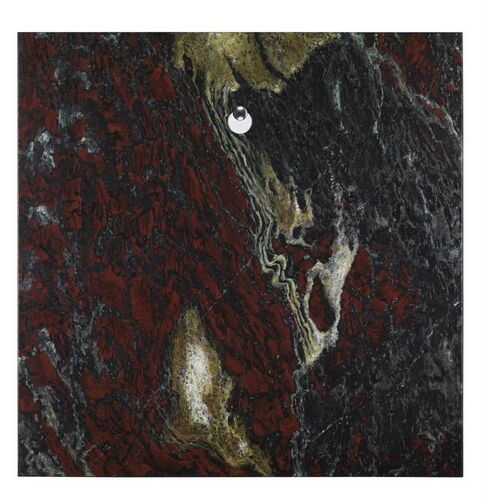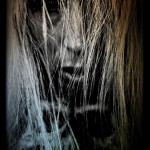Lets read this
This could be a foto of CHANTAL HOOYBERGH, but I couldn’t find one.
Chantal Hooyberg is originally a restaurateur and was commissioned to make the work ‘Fals Abstract/Breccua Fricano’ by Harmen Brethouwer. She restores sculptures, wall and ceiling paintings, gives color advices for rooms and makes reconstructions of old paintings. She lives just outside of the Netherlands and her studio is based in Arendonck, Belgium. That’s all great.
But after trying to find anything more on the internet I realized that it is almost impossible. Chantal is the one who made it. A worker. The instigator of the whole project is Harmen Brethouwer, a man who is far more easy to find on the internet and his work.
Within a couple of minutes I come across an article which explains that it is not uncommon for Brethouwer to be a client to specialist workmen and woman. From painters to bronze, earth ware, marble imitation etc. Also the restriction to two shapes stand out: A square with a hole and the conical shape. Harmen Brenthouwer is more than that though, he wrote a couple of books, is enormously interested in art history and tries to apply this in his own work, in combination with the self placed restrictions of the earlier mentioned shapes. When visiting his website you notice that he divides his works in several categories: Antiques, Art Deco, Chino series and Minimal. By clicking on one of them I come into a web of more diversions in more specialist techniques. While browsing through his website I wonder if it’s really possible for him to have mastered all these techniques, could he have done this all by himself? Or is the need for help a given fact, something he couldn’t do without compromising in any way?

I leave that question for what it is and try to zoom in a bit more on the specific work made by Chantal Hooyberg or should I say Harmen Brethouwer? I don’t know. The whole idea about false abstractions was to ask several leading marble painters to let them paint their most perfect piece of marble. This consecutive to the book he wrote “False Abstracts” where he poses the question how abstract a painting can be, when painted according to nature. 32 different and imaginary marble paintings with a hole in them, resulted. I cant help it but to feel a bit puzzled by the outsourcing thing. I have the feeling that the difference between design and execution is prominent. He, as a designer, came with a plan (the thing what a designer does) and handed it to the craftsman and woman to be executed by them. (making is for the craftsman). This is at least the separation that Ialways thought was true (and Wikipedia confirms my idea as well). I feel, I feel a hierarchy. I hope its not me. But it feels to me that the craftsman is placed subordinate to the designer but I also feel it might just be me. That I might think physical labor is more mundane then the real thinking. Then again maybe the worker envies or hates the thinker, but does the thinker the same with the worker. But I don’t know. I admire the work, I am jealous of the skill but I admire the idea also, and the organization that was necessary to accomplish this work. It feels that I have to choose. Crafts or Design. The construction worker or the architect. I reckon I could also just admire the co-operation of the people. The power of more but also that feels like an easy choice. Saying that everybody did a good job. Maybe I just shouldn’t compare them at all. Chantal Hooyberg and Harmen Brethouwer.
I have continued a couple of days later with the text I’d written then. Reading it back there are two things that pop into my mind. The first is the feeling that I came to the right conclusion. Why should I compare the two. I think many zen-boedhists will agree on the fact that without black there is no white, and without a builder there is no architect. My second realization is that my ‘English’ is not were I would like it to be in. On my way to finish the blog, I realized there is still a question unanswered.
“Could he have done this all by himself? Or is the need for help a given fact, something he couldn’t do without compromising in any way?”
Probably not. Is the answer, mastering all these techniques takes a lot of time, maybe even so much that there would not be space or time for the actual designing part. This has something to do with the separation of labor, the one is a specialist in a field, the other in a different field. The one is not better then the other. And with this moralistic sentence I close this blog.
Thank you.




